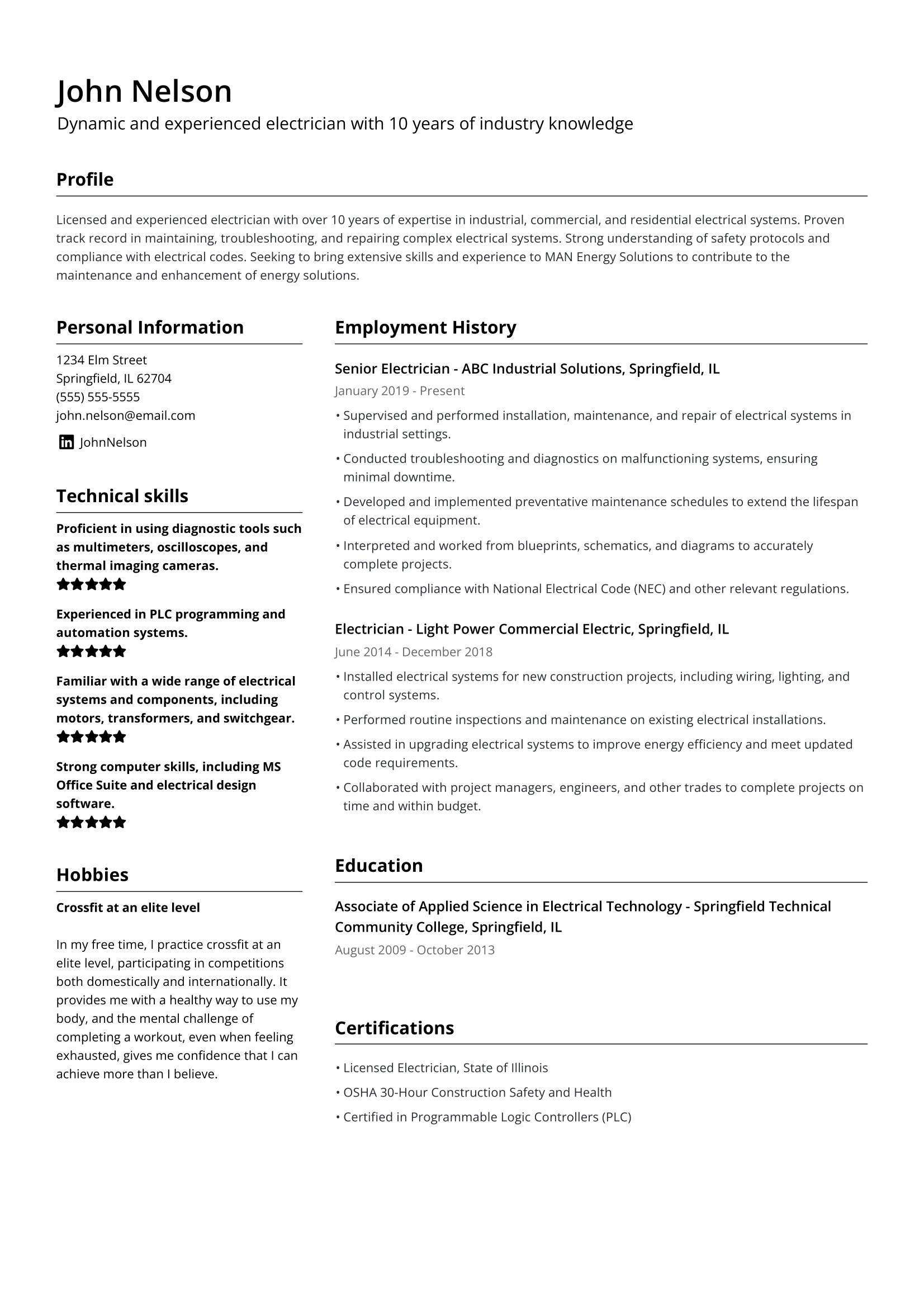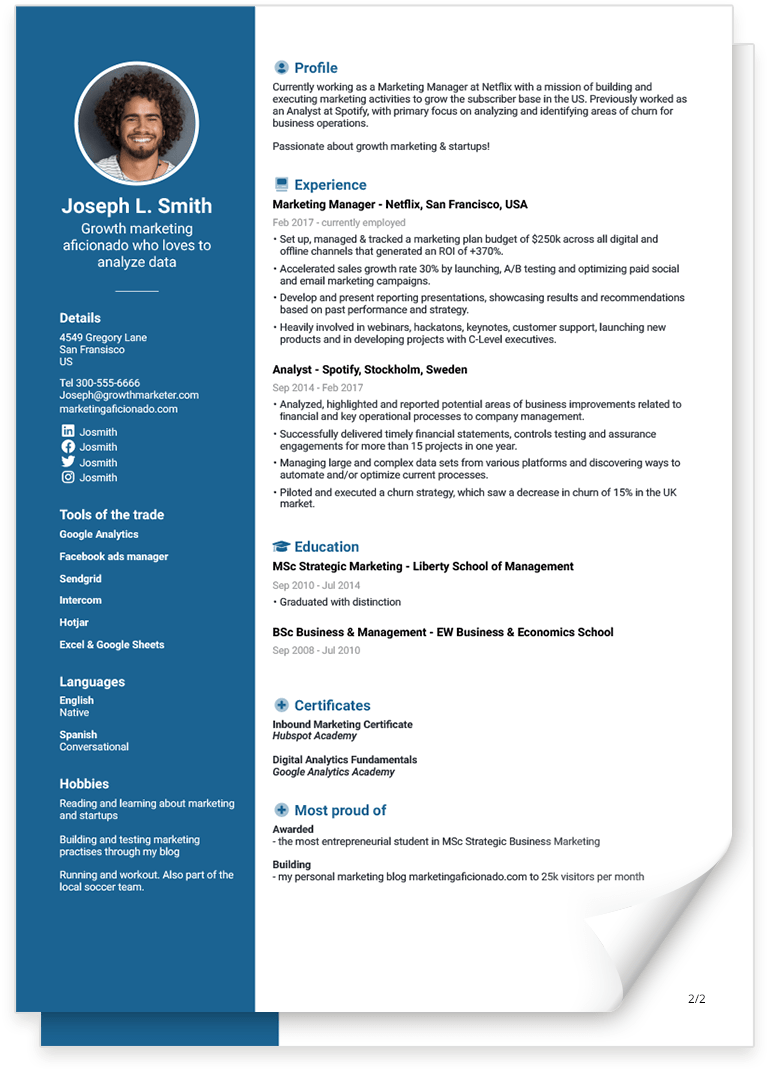The Recruiter's Tips for an Effective Job Search

At Jofibo, we aim to give our users the best possible conditions to apply for their dream jobs. Therefore, we asked Michael Jul Jensen, Senior Recruitment Partner at MAN Energy Solutions, about the secret to standing out when applying for a position at a large global company.
We asked Michael all the questions a job seeker needs to know to get through the recruitment eye of the needle and be invited for an interview. This article is the result. Read on to find out, among other things, the biggest mistake you can make on your resume.
Resume structure and content
In the first part of the article, Michael Jul Jensen shares his insider knowledge about structuring a resume and its content with our users. With Michael's many years of experience in HR and recruitment, you can expect unique perspectives and invaluable insights you won't want to miss.
Following a good resume template as an applicant is a huge relief for the hiring manager.
What is the first thing a recruiter looks for in a resume?
When applying for a job, there are often many applicants for the same position. Therefore, it's crucial to stand out from the crowd as quickly as possible, which is best achieved with a unique resume tailored specifically to the position you're applying for. Besides being tailored to the job, the resume must also be easy to decode, as a recruiter or HR employee often has only a short time to skim through a resume. Therefore, it's incredibly important that there is no clutter in the layout, that the recruiter doesn't have to search for relevant work experiences and education, and that the applicant's unique skills are clear.
In the interview, Michael says:
- The first thing I look for when I get a resume in hand is whether it is clear and easy to read. As someone who reads many resumes every day, it's incredibly important that a resume is set up simply.
For a recruiter, it is crucial that the resume is clear and quick to read through. There is only a short time to decide whether the applicant should move forward in the process or end up in the rejection pile. With one of Jofibo's resume templates, you as a job seeker don't have to worry about the layout. We handle that for you so you can focus on your data.
- One of the most important things about a resume is actually the layout. Where do you read what? I prefer the reverse chronological layout, where the latest or current position is at the top. That way, I don't have to spend time looking for things. If there is a profile text included in the resume, I read it as well, but the facts are most important. Following a good resume template as an applicant is a huge relief for the hiring manager. However, make sure it's not filled with a lot of graphic elements. The purpose of the template is to make the resume clear. Personally, I prefer a two-column template, where I can quickly see the applicant's work experiences and skills. It helps to form a quick and uniform overview.
Below is an example of a two-column resume from Jofibo. The template used is called Elegant.

It's no secret that a resume must be razor-sharp as soon as you send it off. In many large companies, your resume must go through several stages before reaching the final decision-maker. The first stage might be a hiring manager who has many resumes to go through in a day. Therefore, there must be no doubt about where your relevant information is located. Michael, who often receives the resume in the second stage after the initial screening, says:
- When I get a resume in hand, I quickly skim through the most important things before delving into it.
It’s worth noting that while many recruiters prefer clear two-column layouts once a resume reaches human review, resumes at large companies often pass through applicant tracking systems before that point. Some designs can be misread or partially parsed by ATS — something we tested in depth in our guide on ATS-friendly vs. graphic resumes.
How long should the ideal resume be?
At Jofibo, we usually advise that the ideal resume should be between one and four pages long. We naturally also asked Michael about this:
- A resume can certainly be too long, but it can also be too short. If you've had a long career, a resume will naturally be correspondingly longer. And that's okay. But if you've had, for example, 10 different positions over the past 20 years, I recommend describing only the most recent 3-5 positions and including the rest as headings.
According to Michael, you should include your entire career in your resume. However, to avoid the resume becoming much longer than three pages, he recommends describing only the most recent work experiences.
How detailed should a resume be?
Writing a good resume is somewhat of a balancing act. There should be enough details to convince the employer that you have the right experience and skills for the job, but the resume must still remain clear. So where is the line? According to Michael Jul Jensen, a resume can include personal details such as hobbies and family circumstances, as these add a personal touch:
- I think a resume can include more personal details such as hobbies and leisure activities. Family circumstances are also welcome. It adds a personal touch to the resume and helps me get to know the person better. Job seekers should always remember that it's people hiring people. You can also use a bit of humor to stand out. Show that you're willing to share a bit of yourself. However, remember that you never know how the recipient will read your text, so it can be a gamble. But job searching is not a one-size-fits-all activity. Again, you're dealing with people, and job searching is a gamble. My philosophy is 'better to take a chance than not to.'
What is the biggest mistake applicants make on their resumes?
There's no doubt that this question occupies many job seekers. And rightly so. The answer, perhaps unsurprisingly, is that the biggest mistake an applicant can make on their resume is having unexplained gaps.
Michael puts it this way:
- The biggest mistake a job seeker can make on their resume is undoubtedly having gaps in it. If you've been out of the job market for a period, write it down. For example, write that you were job seeking for a period, that you were on parental leave, that you took care of a sick family member, or whatever it might be. Avoid at all costs trying to hide it, because we will notice it right away, and we become suspicious.
So, it's not the gap itself that's the problem. It's the fact that an applicant doesn't explain why there's a gap in the resume that can cause distrust. And to such an extent that you risk ending up directly in the rejection pile.
Additionally, Michael explains that spelling mistakes are also a no-go. Thorough proofreading is a must because if your resume is full of spelling mistakes, it's sloppy. And if you're sloppy with your job application, what about your work? A single typo can, of course, be overlooked by a recruiter, but not more:
- If you're dyslexic, make sure to use a tool that can help you. But do mention that you have this challenge. You must not send an application or resume with spelling mistakes. It shows that you haven't made an effort, and you're already behind.
The structure and content of the cover letter
We then moved on to discuss the structure and content of the cover letter. What is good to include and what should you avoid?
The purpose of a cover letter is to support the data from your resume, but not simply repeat it. In your cover letter, you should provide the arguments for why you should move forward in the process and be invited for an interview. Here, you have the opportunity to showcase more of your personality and professional skills.
When we talked to Michael about the importance and structure of the cover letter, he was very clear: It's important, but the resume is most important:
- We like to see an applicant send both a cover letter and a resume. The resume is the most important, but the cover letter is still essential to include. This is where you show that you're passionate about the position and that you really care about it. It's also where you have the opportunity to showcase more of your personality. The purpose of the cover letter for me is that here you can argue why you should move forward in the application process. It's also in the cover letter that we can see if you've made an effort.
Although some job search experts sometimes say that the cover letter is dead, this is far from the case. The cover letter is still an important part of your job search documents. However, it's not certain that the cover letter will be read if your resume doesn't pass the first screening.
What makes a cover letter stand out?
We asked Michael what can make a cover letter stand out, and the answer might surprise you:
- For me, it's important that the applicant is consistent in their choices. That means there should be a connection between the resume format and the cover letter. For example, if you've made a two-column resume where you've mentioned your relevant skills, they should also be mentioned in your cover letter. Most importantly, there should be a good coherence between the two documents. Avoid having your resume in one color, font, and size, and your cover letter in another color, font, and size. Keep the formatting consistent.
Formatting and coherence between your resume and cover letter significantly affect how you're perceived as a candidate for a position. The greater the coherence you can show, the more professional and thought-out your documents appear. At Jofibo, we offer cover letter templates that match your resume template. This way, you can always be sure that your job search documents appear professional and uniform. Remember, both the resume and the cover letter are the very first impressions a potential new employer gets of you.
How long should a cover letter be?
A cover letter should never be more than one page long. As with your resume, you should consider that the recipient of your cover letter reads many in a day, so it's your task to ensure that the cover letter is as clear and readable as possible. Therefore, what is called a standard page is usually very appropriate. This corresponds to approximately 360 words.
An effective cover letter should contain an interesting text about why you're applying for the position, who you are, and why you can make a difference in this position:
- Make sure to capture interest right from the start with an interesting introduction. Avoid the classic 'I am applying for the position as...'. It's been at least 20 years since that was how you should start your cover letters. My best tip is to make your cover letter interesting and exciting. Stay away from boring clichés and generic phrases.
A cover letter should contribute your best arguments for why the company and recruiter should move forward with you specifically. Here, you should avoid being generic, but instead, highlight your skills and experience in a different way than in your resume.
If you haven't yet started using a tool like Jofibo to create your job search documents, you can sign up for free and test our tool. It's only when you want to download your document that there is a small monthly fee.
About Michael Jul Jensen
Follow Michael Jul Jensen on LinkedIn
Senior Recruitment Partner - MAN Energy Solutions, part of the VW Group with over 672,000 employees across the group. In Denmark, approximately 2,600 people are employed, and 450 work in Frederikshavn. Michael Jul Jensen has overall responsibility for recruitment in Frederikshavn and additionally throughout Denmark for MAN Energy Solutions.

Michael Jul Jensen has held several HR and recruitment positions. Before his current role as Senior Recruitment Partner at MAN Energy Solutions, he was most recently HR and Relations Manager at the web agency Tiger Media.
Michael works wholeheartedly to ensure that employees and colleagues thrive in their roles and thus have the best conditions to succeed in their jobs.
Michael's focus areas are:
★ Being credible as a recruitment partner and conducting the right recruitments
★ Motivating through coaching and presence
★ Ensuring the value of good networking
![Follow Up Email After a Job Interview [Examples 2025]](https://jofibostorage.blob.core.windows.net/blog/Follow-up-email-after-job-interview.png)

![How to Write a LinkedIn Summary [8 Examples]](https://jofibostorage.blob.core.windows.net/blog/how-to-write-a-linkedin-summary-header.png)
